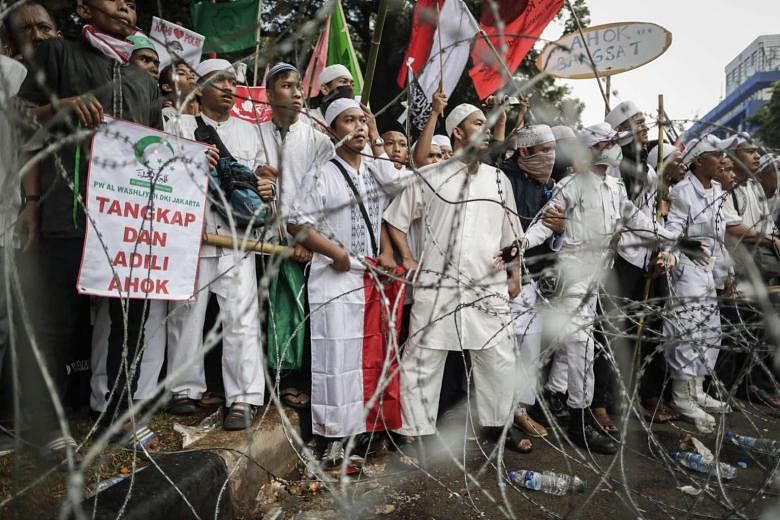Mr Basuki Tjahaja Purnama, popularly known as Ahok and the current governor of Jakarta, seeks re-election next year. Ahead of those polls, a huge anti-Ahok demonstration took place on Nov 4 - the largest since Mr Joko Widodo became president of Indonesia.
The Ahok saga is not yet over. Another demonstration is planned for next Friday, despite Mr Joko and Vice-President Jusuf Kalla calling for it to be cancelled.
It may seem that Islamic groups are demonstrating against Mr Basuki for his alleged blasphemy of insulting the Quran. But those familiar with Jakarta politics see other forces at work, namely, the bitter struggle between the reformists represented by Mr Joko and Mr Basuki and the conservatives, or entrenched interests, represented by former general Prabowo Subianto and former president Susilo Bambang Yudhoyono, with the latter group seeking to use Islamic and racial issues to defeat the reform programme.
Both Mr Joko and Mr Basuki are symbols of Jakarta's "new actors" who do not belong to the existing class of oligarchs. Both seek to reform the system to bring prosperity to the people.
The reform measures appear to have harmed the entrenched interests of those who want to defend the old practices.
On Sept 27, Mr Basuki held a dialogue with the local Muslim population that lasted more than 11/2 hours. The dialogue went smoothly, but at one point, Mr Basuki said some people used (or "pakai" in Bahasa Indonesia) Al-Maida 51 of the Quran to fool voters into not electing him as the future Jakarta governor. Later, a certain "Buni Yani" is reported to have edited the video and deleted the word "pakai" so that the sentence became "Al-Maida 51 of the Quran fooled the people". The tampered version of the video went viral on social media and certain groups began to charge Mr Basuki with "blemishing (the) Quran". When the actual unedited video was put online, it failed to pacify angry members of the Islamic community.

Mr Basuki, a Chinese Christian, is a new type of Indonesian politician. He joined hands with Mr Joko to clean up Jakarta when the latter was governor. After Mr Joko was elected president, Mr Basuki succeeded him as governor and continued the work of cleaning up the city's administration and sorting out its transport problems.
By doing so, he impinged on the entrenched interests of those who favour "irregularities", the term used in Indonesia to refer to corruption. The old forces tried to stop Mr Basuki from introducing reforms, but to no avail.
Mr Basuki himself is not without shortcomings: He is hot-tempered, blunt and often offensive in his comments. While not a Muslim, he was educated in Islamic primary and middle high schools, and has often cited verses from the Quran.
His rivals have seized on this opportunity to try to stop him from running in the Jakarta gubernatorial election next February. Both Mr Prabowo and Dr Yudhoyono, who was president of Indonesia for two terms, are eyeing the post of governor and the presidency for their preferred candidates.
The proposed candidates for Mr Prabowo's Gerindra Party are former education minister Anies Baswedan and businessman Sandiaga Uno. Dr Yudhoyono's Partai Demokrat has proposed as its candidates his son, Mr Agus Harimurti Yudhoyono, and Jakarta council administrator Sylviana Murni. These two pairs are up against Mr Basuki and running mate Djarot Saiful Hidayat, who are supported by the Indonesian Democratic Party of Struggle (PDI-P), Golkar and some smaller parties. Under normal circumstances, the other parties' candidates would have little chance of defeating the Basuki-Djarot pairing. Mr Basuki was a popular governor who garnered support from one million Jakarta voters for his candidacy even before he accepted the nomination of the political parties in September.
Mr Joko has as president been able to consolidate his power. Initially, his support in Parliament was weak, but that has changed. Even Golkar has said it wants to nominate Mr Joko - who contested the last election under the PDI-P banner - as its presidential candidate in 2019. That would not be in the interests of either Mr Prabowo or Dr Yudhoyono, since whoever wins next year's Jakarta gubernatorial election will receive a boost for himself and his party in the nomination process for the next presidential election.
Jakarta's old establishment is eager to stop the reformists from advancing in Indonesia's political landscape. It is thus no surprise that Mr Joko's government revealed that political elements were behind the anti-Ahok demonstration of Nov 4. More than 100,000 people took part in the demonstration, which was organised by 35 Islamic groups including the Front Pembela Islam and Himpunan Mahasiswa Islam.
The demonstrators were well organised. Many were not from Jakarta but transported from other areas to the capital to oppose Mr Basuki's candidacy. They were given food, lodging, transport, clothing and money to be in Jakarta for several days. Without someone to foot these bills, the big demonstration could not have materialised. Some poor residents of Jakarta who were displaced from their homes and trade unionists demanding a pay rise also took part, but they were the minority.
Mr Joko's administration has agreed to let the police investigate the blasphemy case against Mr Basuki. As long as Mr Basuki is not found guilty, he will be able to contest the upcoming election for governor.
There is thus no end in sight for the struggle between Jakarta's reformists and entrenched interests. The latter seem to have decided to use Islam and race in their fight for power as they do not have the option of fighting elections on secular themes such as anti-corruption and clean government.
- The writer is visiting senior fellow, Iseas - Yusof Ishak Institute.
Correction note: The story was corrected to say that another demonstration is planned for next Friday, not Thursday, despite Mr Joko and Vice-President Jusuf Kalla calling for it to be cancelled.

